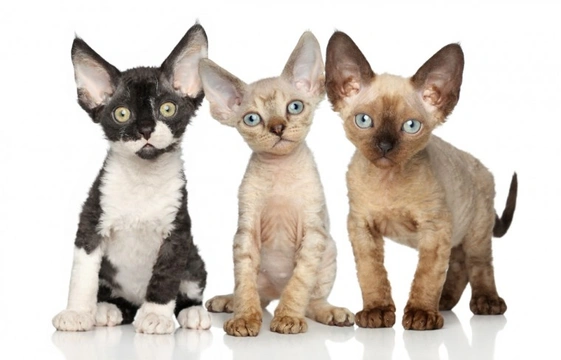
10 interesting and informative facts about the Devon Rex cat breed for prospective kitten buyers
The Devon Rex is a cat breed that is very well known despite not being hugely common, thanks to one very unique trait that causes them to have a distinctive and unusual coat.
This type of trait can be very polarising with cat lovers, with some finding it highly desirable and others disliking it, but one thing that is for certain is that the Devon Rex personality is a very appealing one, and one that helps cats of the breed to win new fans and followers every year!
If you’re considering buying a Devon Rex kitten or are beginning to weigh up the pros and cons of Devon Rex cats compared to other cat breeds, getting the facts first is important.
There are lots of good points to the breed but some challenges too, and some myths and misinformation floating around about the Devon Rex coat and its traits as well.
With this in mind, this article will share 10 interesting and informative facts about the Devon Rex cat breed for prospective kitten buyers to get you started. Read on to learn more.
The Devon Rex has a curly coat!
That distinctive and unusual Devon Rex coat trait we alluded to earlier on is that cats of the breed have a curly coat! This is certainly something that you don’t see every day, and results in cats of the breed having a distinctive and unusual coat style, which doesn’t usually appear specifically as curls in the human sense of the world, but rather as whorls, waves, and kinks, giving cats of the breed a disrupted rather than smooth coat texture.
The Devon Rex coat first occurred due to a genetic mutation
The Devon Rex breed was founded in 1959 when the first cat with this coat style was found, occurring naturally within a litter produced from cats whose own coats were standard or normal.
This happened as the result of a naturally occurring genetic mutation, which is a recessive one; which means that you need to breed two cats that both carry and express the gene to produce curly-coated kittens. One parent with the gene and one without will result in kittens with a normal coat.
The Devon Rex is not the only curly-coated cat breed
The Devon Rex’s coat is unusual, but interestingly it is not in fact the only cat breed to display such a trait! Another curly coated cat breed is the Cornish Rex, which as the name implies, is a very close geographical neighbour to the Devon Rex, being in fact in a neighbouring county.
This is not even the limit of the curly-coated breeds either, but is the nearest in origins!
However, the Devon and Cornish Rex coats occur due to different gene mutations
Given how closely situated the origins of the Devon Rex and Cornish Rex breeds are geographically, you might also fairly assume that they are close genetic relatives too.
However, this is not the case. The genetic mutations and gene involvement that causes the curl in the Devon and Cornish Rex coats respectively is different, and they are recognised as separate, standalone breeds as a result of this.
The Devon Rex is sometimes wrongly referred to as a hypoallergenic cat breed
The fact that the Devon Rex’s coat is curly means that to an extent, fur that they shed naturally gets caught in the rest of the coat rather than dropping around the house heavily. Additionally, the Devon Rex is also reasonably low shedding compared to most breeds even taking this into account.
All of this combined means that many people wrongly refer to the Devon Rex as a hypoallergenic cat breed; but this is a misnomer, as cats of the breed still produce allergenic protein chains in their saliva and sander, just like any other breed.
Devon Rexes are moderately costly to buy but not prohibitively expensive
The Devon Rex’s average purchase price is around the middle or normal range across the board for pedigree cat breeds as a whole. As of the time of writing (2019) the average asking price for Devon Rex cats in the UK was around £600.
The Devon Rex is playful, mischievous and personable
The Devon Rex personality is personable, inquisitive and playful, and they are often good hunters too. They tend to actively enjoy human company, and seek out their owners and housemates for companionship.
The Devon Rex breed is recognised as a pedigree by the GCCF
The Devon Rex cat breed is formally recognised by the GCCF in the UK as a pedigree cat breed, and as such, cats of the breed with pedigree status will have a traceable history and are eligible for pedigree registration and cat show participation.
Devon Rex cats tend to be fairly long lived for a pedigree breed
Devon Rex cats have an average lifespan of around 12-16 years, which is on the high side for a pedigree breed.
There is, however, one hereditary health issue found within the breed that breeders should test for in their parent stock, which is called congenital myasthenic syndrome.
…And that signature coat is not associated with any health problems specifically
The curled coat of the Devon Rex breed is unusual, but it does not cause any specific health problems for the cats that possess it. This is not the case for all genetic anomalies in different cat breeds, and so is worth pointing out just for your peace of mind!



